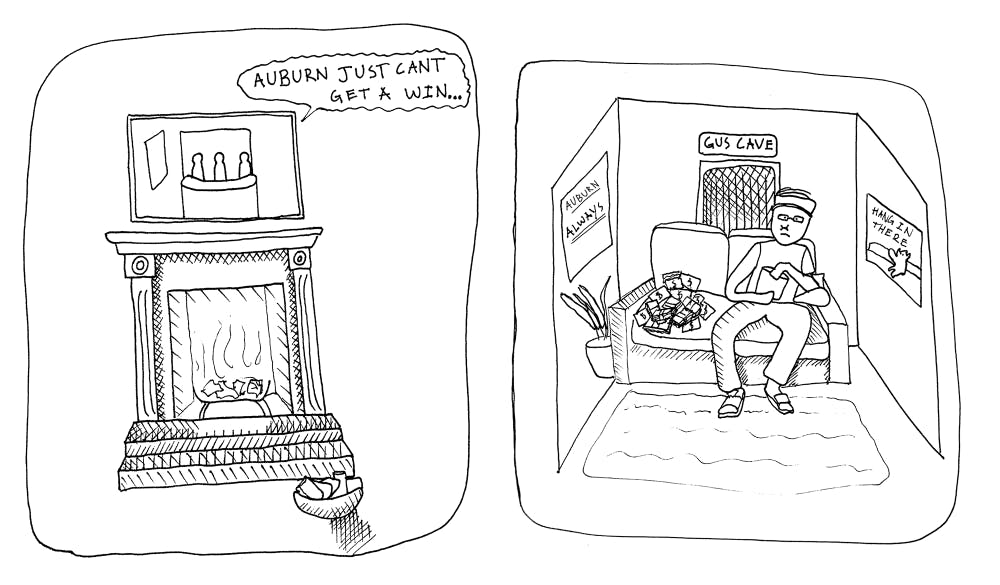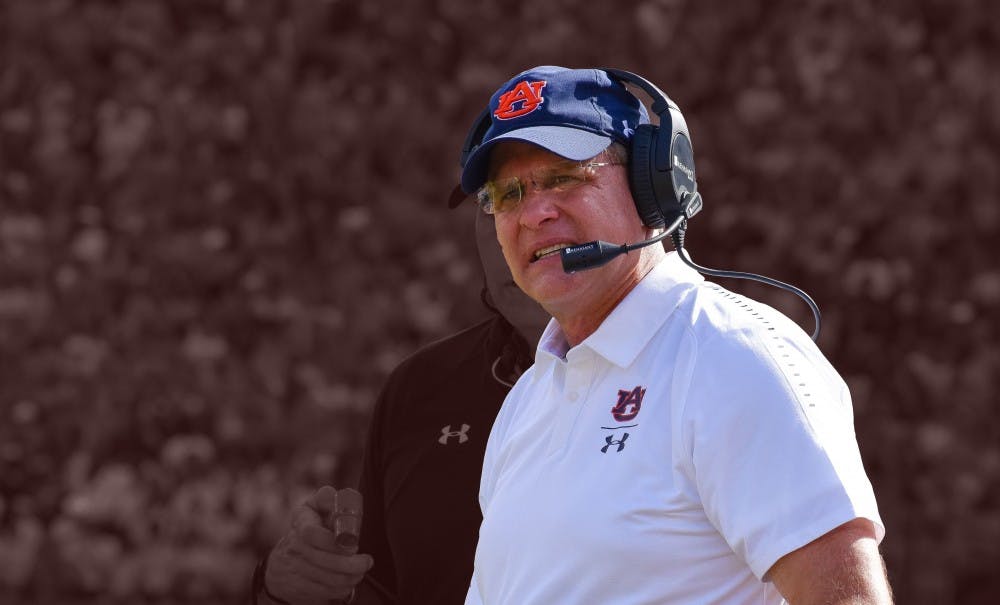As the fifth-highest-paid coach in college football, it would seem as though Auburn head coach Gus Malzahn should be performing as though he deserved a salary so high.
He’s not.
Malzahn has proven himself an underperforming investment time after time, but Auburn has bound itself to him with an almost impenetrable contract.
That was a bad decision.
Even though Auburn was forced to negotiate the contract at a time when Malzahn was coming off the high of beating two straight No. 1-ranked teams, and Auburn had not yet put in place its new athletic director, that’s not an excuse for the foolery that is his contract.
Before last season’s home wins against Alabama and Georgia, it seemed as though Malzahn had done little to push the football program forward.
Auburn was struggling to find a consistent quarterback, and the Tigers’ offense looked lackluster, to say the least. This poor performance was surprising since Malzahn consistently pulls in top-tier recruiting classes.
Last season, Malzahn pulled out those two wins, but he managed to lose to both Georgia and UCF in post-season games, which arguably counted for much more than those regular-season wins.
When Arkansas began making moves to pull Malzahn their way, Malzahn was offered a $49-million contract extension — he took the offer.
We should have let him go.
Of course he took our offer, he wanted a sweet deal that would last him for almost an entire decade and so royally cushion his pockets either way that it doesn’t really even matter if he wins or loses.
What President Steven Leath and members of the Board of Trustees, who negotiated for this inordinately long and costly contract extension, could not see was that those two post-season games of the 2017 season would be a preview of the failings of the Auburn team this fall.
What they could see, however, was Malzahn’s rollercoaster performance in the past and his continuing failure to develop four-and-five-star recruits into standout players on the field.
After those two wins against Auburn’s greatest rivals, last season looked hopeful — like Auburn had a football team that could make it to the playoffs.
What is hard to grasp is how that season — in which the Tigers lost to LSU and Clemson in the fall — justified a more than $2-million annual raise for Malzahn and a 7-year contract extension that indebted Auburn to Malzahn in the form of a massive buyout if his lackluster, rollercoaster performances happened to continue as they have.
This folly of a contract was almost an attack on the good sensibilities of Auburn fans — an attack on our wallets.
What had Malzahn been doing so well that justified him receiving one of the best contracts in the nation?
There is always one loophole to get out of a contract with a coach, though — a form of firing known as a buyout, or quite literally buying out the 75 percent of Malzahn’s salary that his contract guarantees him.
Auburn shot itself in the foot in the form of a way-too-long 7-year extension for the exorbitant amount of $49 million. A contract that ensures he receives at least 75 percent of that salary means that a buyout, at this point in time, would cost over $32 million, at least.
Even if the Tigers waited until 2021, Malzahn’s buyout would be $16 million because of the three years remaining on his contract.

Essentially, Auburn signed a contract that had no repercussions for poor performance.
Auburn is likely not going to make it to any relevant bowl game this year, not with the SEC contenders it has left on its schedule and three losses under its belt at this point in the season.
We still have to play Georgia and Alabama, after all.
Auburn football generated over $147 million in revenue last year, which set a precedent for years to come — a precedent that an average or below-average season is sure not to meet.
Not attending a meaningful bowl game will cost the Auburn program and the SEC millions.
Losing football games — football games a program like Auburn should be winning — means fewer viewers and fewer people willing to attend the games.
Despite a prodigious buyout, having to spend that amount of money would arguably cost the University less than it would to hold onto a failing program.
It’s a lose-lose situation for Auburn, whether they buy out Malzahn’s contract or keep him on. For Malzahn, it’s a win-win.
He’ll make millions either way.
Editorials are the majority opinion of The Auburn Plainsman's editorial board. If you would like to submit an op-ed, visit this page.
Do you like this story? The Plainsman doesn't accept money from tuition or student fees, and we don't charge a subscription fee. But you can donate to support The Plainsman.
The opinions of The Auburn Plainsman staff are restricted to articles marked "opinion" or "editorial." This editorial is the majority opinion of the Editorial Board and is the official opinion of the newspaper.
The opinions expressed in columns and letters represent the views and opinions of their individual authors, not the opinion of the newspaper. And often, those individual opinions conflict with the opinion of the newspaper.
These opinions do not necessarily reflect the Auburn University student body, faculty, administration or Board of Trustees.





